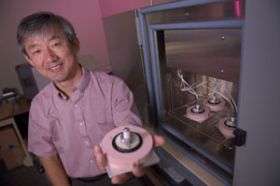Invention could help reduce highway repairs

(PhysOrg.com) -- Ohio University has licensed a new device that tests the durability of highway asphalt to an Athens, Ohio-based company founded by the engineering professor who invented the technology.
Sang-Soo Kim, an associate professor of civil engineering in the Russ College of Engineering and Technology, developed the Asphalt Binder Cracking Device (ABCD) in a quest to find a reliable way to determine which types of pavement hold up to the stress of highway traffic and cold weather extremes. State transportation departments spend billions of dollars annually to repair cracks, ruts and potholes on the nation’s roadways.
With help from Ohio University’s Technology Transfer Office and Innovation Center, Kim founded EZ Asphalt to commercialize his invention. Ohio University owns the patent on the device, and Kim has licensed the technology back from the institution in order to market it to government agencies, private corporations and university research laboratories.
“The Asphalt Binder Cracking Device is an excellent example of how Ohio University researchers are developing new technologies that solve real-world problems,” said Lisa Rooney, director of the Technology Transfer Office. “We’re excited about taking this invention to the marketplace.”
The ABCD is about the size and shape of a round beverage coaster and contains a metal testing ring. Kim pours different types of asphalt into the device, and places it a cooling chamber that resembles a small stainless steel refrigerator. An off-the-shelf computer program records the coldest temperature at which the asphalt will crack. The chamber can check 16 specimens at once, and the testing process takes three hours.
“There’s no comparable technology out there, and people like the ABCD because it’s an easy, simple process,” said Kim, who is a member of Ohio University’s Ohio Research Institute for Transportation and the Environment.
Kim projects that he could sell 1,000 units of the ABCD in five years.
In preliminary tests on pavement samples from Pennsylvania and Canada, the ABCD provided more accurate, consistent results than conventional estimates of asphalt cracking, he said.
Just one cold snap can create a crack that deteriorates an entire roadway, the engineer explained. Once water seeps into the pavement, the structure weakens. Kim estimates that the United States spends tens of billions of dollars each year to seal cracks and repair road damage.
That’s motivated Kim and student researchers in the Russ College of Engineering and Technology to spend several years developing the right design for the ABCD. The work has provided a great experience for engineering students, Kim said, as they’ve learned how the problem-solving skills honed in the laboratory and classroom can help them make positive contributions to society.
“Engineers are very practical – they want to solve real-world problems,” he said. “It’s really satisfying when you can do that.”
Kim received a patent on the device in August 2007. In January, the Federal Highway Administration provided $239,000 in funding to help him commercialize the technology. Purdue University and the University of Wisconsin-Madison will conduct additional testing with the ABCD to determine if improvements are needed, Kim said.
The ABCD is one of several technologies that Ohio University has licensed to companies for commercialization. In fiscal year 2008, the university received $5.9 million in royalty income, much of which stems from a license for a 1988 research discovery at the Edison Biotechnology Institute. The work led to the development of a drug for people with acromegaly, a form of gigantism that creates excessive growth of bones and organs in adults.
Provided by Ohio University





















